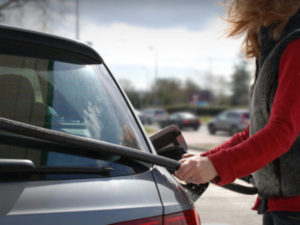Government responds to initial CMA fuel price review
The Government has officially responded to the CMA’s initial findings into the UK fuel retail market, welcoming recommendations on an open data scheme but more cautious on transparency measures for motorway pricing.

The RAC said it was encouraging the Government is talking about an ‘open data scheme’ that could help drivers to compare local fuel prices
The initial CMA review was published this summer on the back of a request from former Business Secretary Kwasi Kwarteng amid record fuel prices despite March’s fuel duty cut.
The review drew several conclusions:
- Overall, the market for the supply of retail fuel in the UK appears relatively competitive, but there are local variations in the price of road fuel, including pricing disparities between urban and rural areas.
- Overall, retailer spread (the difference between wholesale and retail fuel prices) is a relatively small component (around 10p per litre) of the pump price.
- There is no evidence, nor is it clear from analysis that retailers in aggregate have profited from failing to pass on the 5p fuel duty cut.
- The impact of the refining spread on the price of road fuels is significant and needs more investigation to see what is driving the recent sharp increases. This led to the decision to launch a full market study into road fuel.
The CMA also made two recommendations on measures the government could consider to further improve retail fuel price transparency:
- An open data scheme through which individual forecourt prices are collected and made freely available; similar to Northern Ireland’s Fuel Price Checker.
- Motorway pricing – the competitions regulator said better information on motorways about pump prices, including those at nearby off-motorway petrol stations, could help consumers make better decisions about whether and where to buy.
In its response this week, the Department for Business, Energy & Industrial Strategy (BEIS) said it agreed that an open data scheme “could have the potential to increase transparency around fuel prices and be a pro consumer measure”.
It’s added that it will commit to swift further work and analysis to assess the feasibility of this recommendation, including timescales for implementation and legislative vehicles, and whether any such scheme would be likely to have a notable impact on fuel price transparency. The Government will also look at successful implementation of similar schemes in other countries.
But it was less supportive of measures to increase transparency on motorway pricing and said that further work and analysis was needed to assess the merits of this recommendation and whether this would be likely to have a notable impact on fuel price transparency.
RAC fuel spokesperson Simon Williams said it was encouraging the Government is talking about an ‘open data scheme’ that could help drivers to compare local fuel prices.
“Hopefully, this would also lead to more custom for the lowest-priced retailers and incentivise others to price more competitively.”
But he added: “There is, of course, the danger that retailers will just ‘price-match’ one another at levels that still don’t fairly reflect wholesale prices.”
He also said the RAC was hoping that the CMA’s more detailed market study would be able to shed some light on why the “biggest fuel retailers have significantly upped their margins during an extended period of lower wholesale costs instead of passing on lower prices to drivers at their pumps in the cost-of-living crisis”.
Williams continued: “This has led to an unusual situation where many smaller forecourts have been charging far less than their bigger rivals. As supermarkets normally price their fuel 4p lower than the UK average drivers who continue to fill up at their forecourts without shopping around may have lost out significantly.
“As well as knowing where they can buy the cheapest fuel drivers need some indication of whether retailers are charging a fair price in the first place.”
The Petrol Retailers’ Association also welcomed the Government’s official response:
Gordon Balmer, executive director, said: “We are pleased that the Government has acknowledged that petrol retailers did not profit from 5 pence-per-litre fuel duty cut.
“Independent forecourts have worked extremely hard to keep their communities fuelled and fed, and it is gratifying to be exonerated from the accusations previously made against our members.
“In these uncertain times, it is important that we remain united. I will continue to make myself available to government representatives.”













